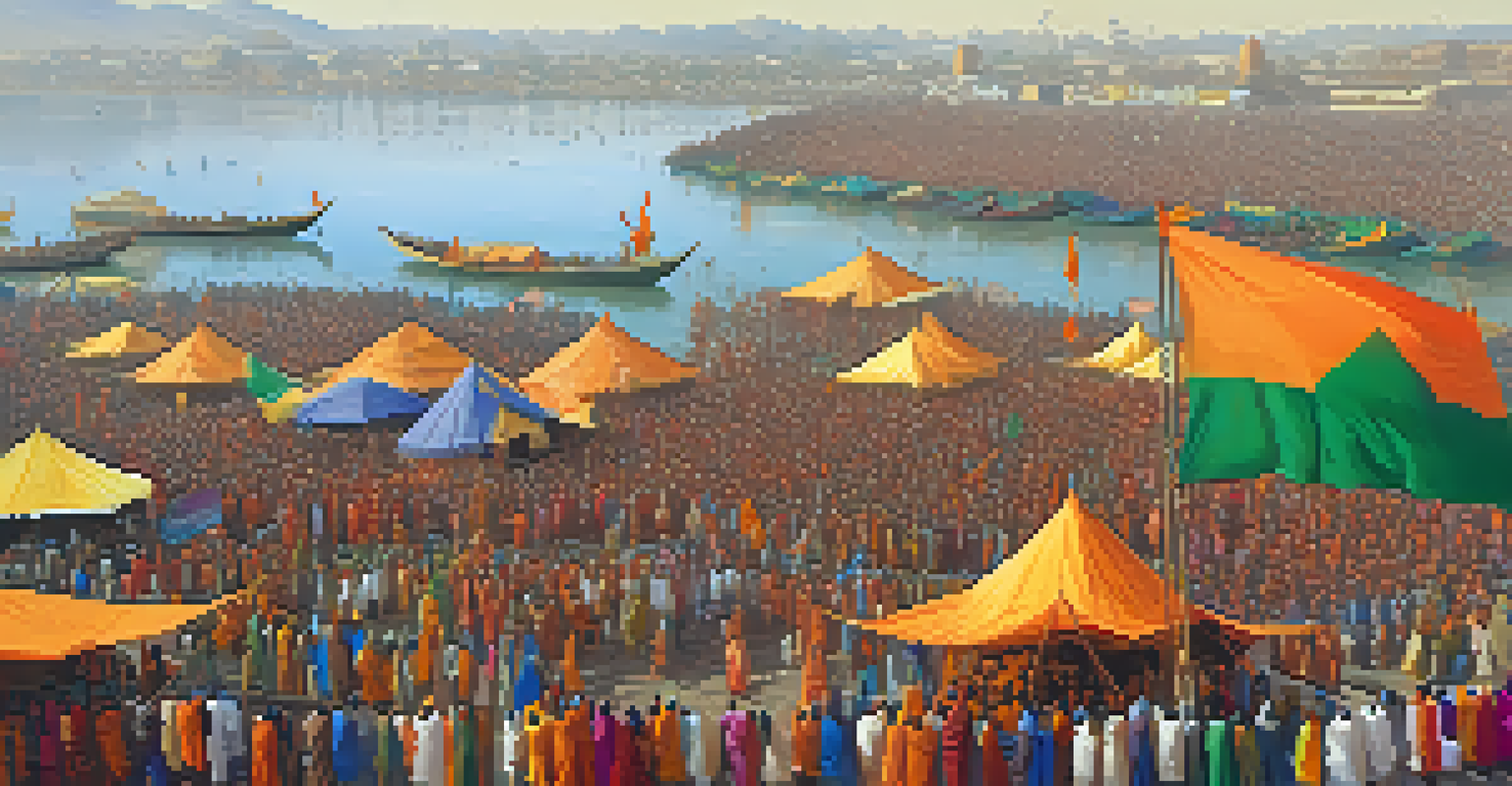Pilgrimages: Personal Journeys to Sacred Locations

Understanding Pilgrimages: A Journey Beyond Borders
Pilgrimages are more than just physical journeys; they are deeply personal experiences that connect individuals with their beliefs, cultures, and histories. These sacred travels often lead to religious sites, but they can also encompass natural wonders or historical landmarks that hold significance for the traveler. From the Camino de Santiago in Spain to the Hajj in Mecca, each pilgrimage carries its own unique stories and meanings.
A pilgrimage is not just a journey to a sacred place, but a journey to the sacred within ourselves.
The motivation behind these journeys can vary widely. For some, it’s a quest for spiritual enlightenment, while others seek healing, reflection, or even adventure. Regardless of the reason, pilgrims often find that the act of traveling to these sacred locations brings clarity and purpose to their lives.
It's fascinating to see how different cultures and religions interpret the concept of pilgrimage. In many traditions, the journey itself is as important as the destination, offering lessons and insights along the way that shape the traveler's experience.
The Spiritual Significance of Pilgrimages
At the heart of pilgrimages lies a profound spiritual significance. Many believers embark on these journeys seeking a deeper connection with their faith, a chance to cleanse their souls, or to seek divine intervention. Rituals performed at these sacred sites often enhance this spiritual experience, creating a sense of community among fellow travelers.

For instance, the act of walking the Camino de Santiago is as much about self-discovery as it is about reaching the cathedral at Santiago de Compostela. Pilgrims often report transformative experiences, where the challenges of the journey help them confront personal struggles and emerge with renewed strength.
Pilgrimages Foster Spiritual Growth
These journeys often lead to profound personal insights and a deeper connection with one's faith.
Moreover, the spiritual aspect of pilgrimages is not limited to organized religions. Individuals from all walks of life have found their own sacred paths, exploring places that resonate with their beliefs, whether through meditation retreats or nature walks that evoke a sense of wonder and connection to the universe.
Cultural Insights Gained Through Pilgrimages
Pilgrimages offer travelers a unique opportunity to immerse themselves in different cultures. As pilgrims traverse various landscapes, they encounter diverse customs, languages, and traditions that enrich their understanding of the world. This cultural exchange is often a highlight of the journey, revealing the beauty of human connection across geographical boundaries.
The journey of a thousand miles begins with one step.
Take, for example, the Kumbh Mela in India, one of the largest religious gatherings in the world. Pilgrims from all over the country and beyond converge to participate in rituals, share stories, and celebrate their faith. The vibrant tapestry of culture and spirituality at such events showcases the common threads that bind humanity together.
In this way, pilgrimages not only serve as a means of personal reflection but also as a bridge that fosters understanding and compassion among different cultures. Travelers return home not just with stories of their journeys but with a newfound appreciation for the diversity of human experience.
Challenges Faced on the Pilgrimage Path
While pilgrimages are often seen as uplifting experiences, they can also present significant challenges. The physical demands of long journeys, unpredictable weather, and the emotional toll of self-reflection can test even the most dedicated pilgrims. Nevertheless, these hardships often contribute to the growth and insight gained during the journey.
For instance, the trek to the sacred site of Machu Picchu requires not only physical stamina but also mental resilience. Many pilgrims share that overcoming these obstacles is a rewarding part of their experience, teaching them valuable lessons about perseverance and self-discovery.
Cultural Exchange Enriches Journeys
Traveling as a pilgrim allows individuals to engage with diverse customs and traditions, enhancing their understanding of the world.
Furthermore, the challenges faced can lead to a sense of camaraderie among travelers. Sharing stories of struggle and triumph can create deep bonds, reminding us that we are not alone on our journeys, whether they are physical or spiritual.
The Role of Community in Pilgrimages
Community plays a vital role in the pilgrimage experience, often transforming individual journeys into collective endeavors. Pilgrims frequently travel in groups, sharing their hopes and fears while supporting one another along the way. This sense of belonging can enhance the overall experience, making it more meaningful.
During the Hajj, for example, millions of Muslims come together in Mecca, participating in rituals that foster a powerful sense of unity and shared purpose. The collective experience of worship and devotion is a reminder that spirituality can be both personal and communal.
Even smaller pilgrimages benefit from community engagement. Local gatherings, shared meals, and group reflections create lasting connections among travelers, turning the pilgrimage into a shared tapestry of stories and experiences that enrich each person's journey.
Modern Pilgrimages: A New Era of Spiritual Travel
As society evolves, so too does the concept of pilgrimage. Modern travelers are redefining what it means to embark on a sacred journey, often blending traditional practices with contemporary values. This shift has led to a rise in unique pilgrimages that appeal to diverse audiences, such as eco-pilgrimages or wellness retreats that emphasize mindfulness and self-care.
For instance, the rise of digital nomadism has seen many individuals seeking spiritual retreats in far-flung corners of the globe, where they can connect with nature and themselves. These modern pilgrims often prioritize sustainability and personal growth, reflecting a broader cultural shift towards holistic well-being.
Community Enhances Pilgrimage Experience
Shared experiences among pilgrims create a sense of belonging, making the journey more meaningful and impactful.
Additionally, social media plays a crucial role in this new era, allowing travelers to share their experiences and connect with like-minded individuals. Pilgrimages are no longer solitary pursuits; they are communal experiences that inspire others to embark on their own journeys of self-discovery.
The Lasting Impact of Pilgrimages on Personal Identity
The impact of pilgrimages extends far beyond the journey itself, often influencing a person's identity long after they've returned home. Travelers frequently report that these experiences reshape their perspectives, beliefs, and priorities, leading to a more profound understanding of themselves and their place in the world.
For instance, many who complete the Camino de Santiago find that they’ve not only gained a sense of accomplishment but also a deeper appreciation for simplicity and mindfulness in everyday life. The insights gained during the pilgrimage can lead to lasting changes in habits, relationships, and overall outlook.

Ultimately, the journey becomes a defining moment in a person's life, offering lessons that resonate for years to come. Whether it's a newfound commitment to spirituality, a desire to explore more of the world, or a shift in personal values, the pilgrimage experience leaves an indelible mark on the traveler's identity.